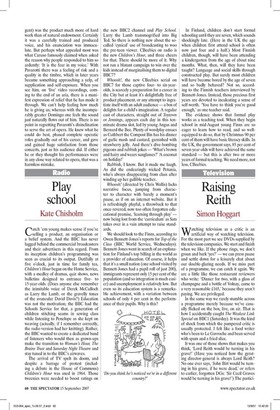Play school
Kate Chisholm atch 'em young makes sense if you're selling a product, an organisation or a belief system. And the BBC has never lagged behind the commercial broadcasters and their advertisers in this regard. From its inception children's programming was seen as crucial to its output. Dutifully at five o'clock, just in time for family tea, Children's Hour began on the Home Service, with a medley of dramas, quiz shows, news bulletins designed to entrance fiveto 15-year-olds. (Does anyone else remember the inimitable voice of Derek McCulloch as Larry the Lamb, or the gravelly tones of the avuncular David Davis?) Education was not the motivation; the BBC had the Schools Service for that, a generation of children stitching seams in sewing class while listening to Penelope as she kept on weaving (actually, if I remember correctly, the radio version had her knitting). Rather, the BBC wanted to create a dedicated band of listeners who would then as grown-ups make the transition to Woman's Hour, The Brains Trust and Saturday Night Theatre and stay tuned in to the BBC's airwaves.
The arrival of TV spelt its doom, and despite a barrage of protest (including a debate in the House of Commons) Children's Hour was axed in 1964. Those tweenies were needed to boost ratings on the new BBC2 channel and Play School. Larry the Lamb transmogrified into Big Ted. So there is nothing new about the socalled 'cynical' use of broadcasting to woo the pre-teen viewer. CBeebies on radio is the new Children's Hour, and three cheers for that. There should be more of it. Why not run a blatant campaign to win over the kids instead of marginalising them to digital BBC7?
Whoosh!, the new CBeebies serial on BBC7 for those captive fourto six-yearolds, is scarcely a preparation for a career in the City but at least it's delightfully free of product placement, or any attempt to ingratiate itself with an adult audience — a box of delights for a child's imagination. A regular cast of characters, straight out of Toytown or Jennings, appears each day in this tenminute drama slot, led by young Angus and Bernard the Bee. Plenty of wordplay ensues as Cuthbert the Compost Bin has his dinner of garlic mash and custard, garnished with strawberry jelly. And there's dive-bombing pigeons and rubbish jokes — 'What's brown and hairy and wears sunglasses?' 'A coconut on holiday!'
Rubbish, I know. But it made me laugh. As did the endearingly wicked Petunia, who's always disappearing from class after winding up her gullible teacher.
Whoosh! (directed by Chris Wallis) lacks narrative focus, jumping from character to character with barely a moment's pause, as if on an internet website. But it is refreshingly playful, a throwback to that once-revered, now too often forgotten educational premise, 'learning through play' — now being lost from the 'curriculum' as Sats takes over in a vain attempt to raise standards.
We should look to the Finns, according to Owen Bennett-Jones's reports for Top of the Class (BBC World Service, Wednesdays). Bennett-Jones went in search of an explanation for Finland's top billing in the world as a provider of education. Of course, it helps that it's a small nation (one school visited by Bennett-Jones had a pupil roll of just 200), immigrants represent only 15 per cent of the population (and so integration is much easier) and unemployment is relatively low. But even so its education system is a remarkable achievement, with a variation between schools of only 4 per cent in the performance of their pupils. Why is this?
((HOTEL In Finland, children don't start formal schooling until they are seven, which sounds shockingly late. (Here in the UK the age when children first attend school is often now just four and a half.) Most Finnish children, though, will have been attending a kindergarten from the age of about nine months. What, then, will they have been taught? Language and social skills through constructed play. But surely most children will have become bored by the age of seven and so badly behaved? Not so, according to the Finnish teachers interviewed by Bennett-Jones. Instead, those precious first years are devoted to inculcating a sense of self-worth. 'You have to think you're good enough,' as one teacher said.
The evidence shows that formal play works as a teaching tool. When they begin school in mid-August young Finns are so eager to learn how to read, and so wellequipped to do so, that by Christmas 90 per cent of them will have basic literacy skills. In the UK, the government says, 85 per cent of seven-year-olds will have achieved the same standard — but this is after two or more years of formal teaching. We need more, not less, CBeebies.

























































 Previous page
Previous page